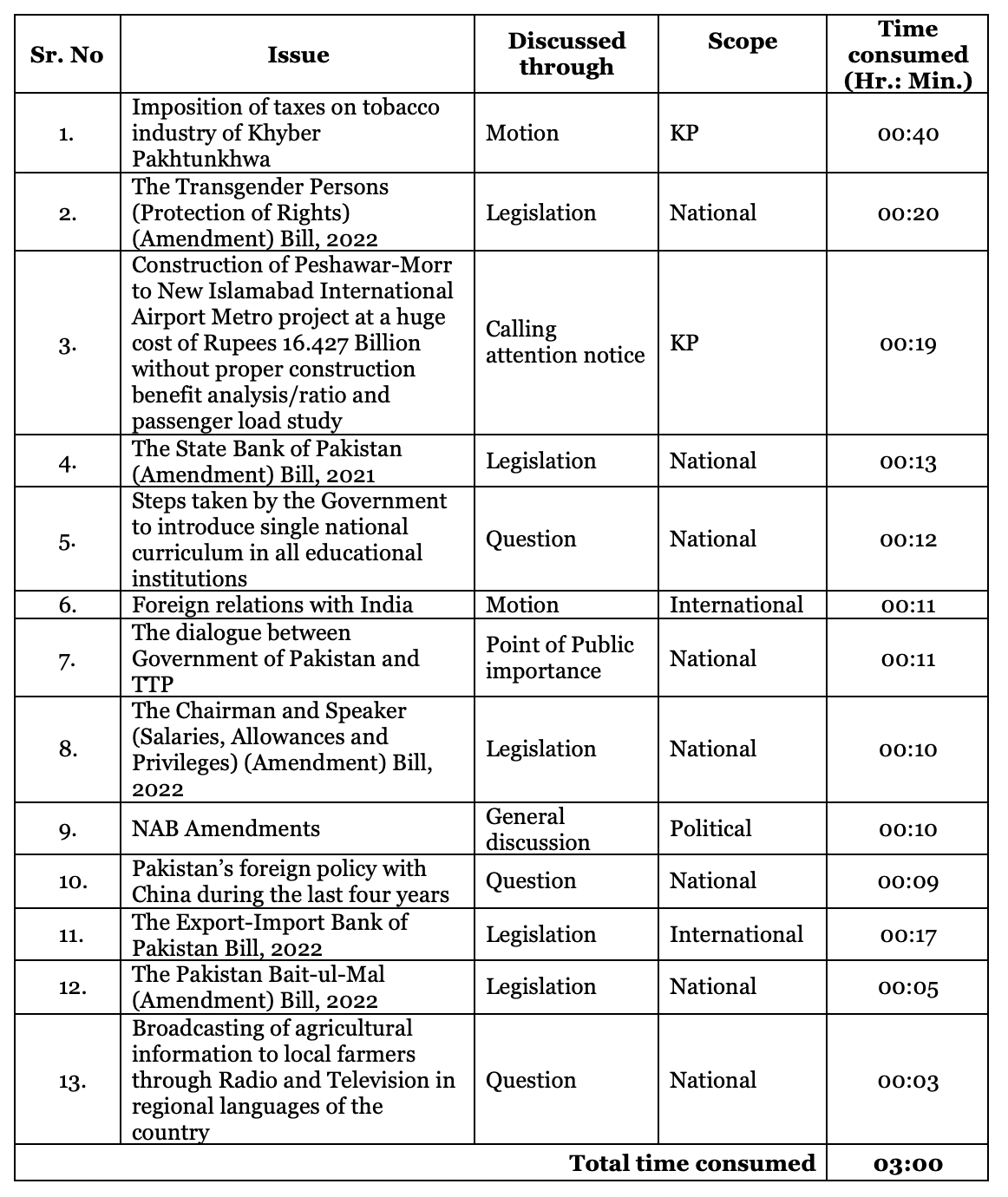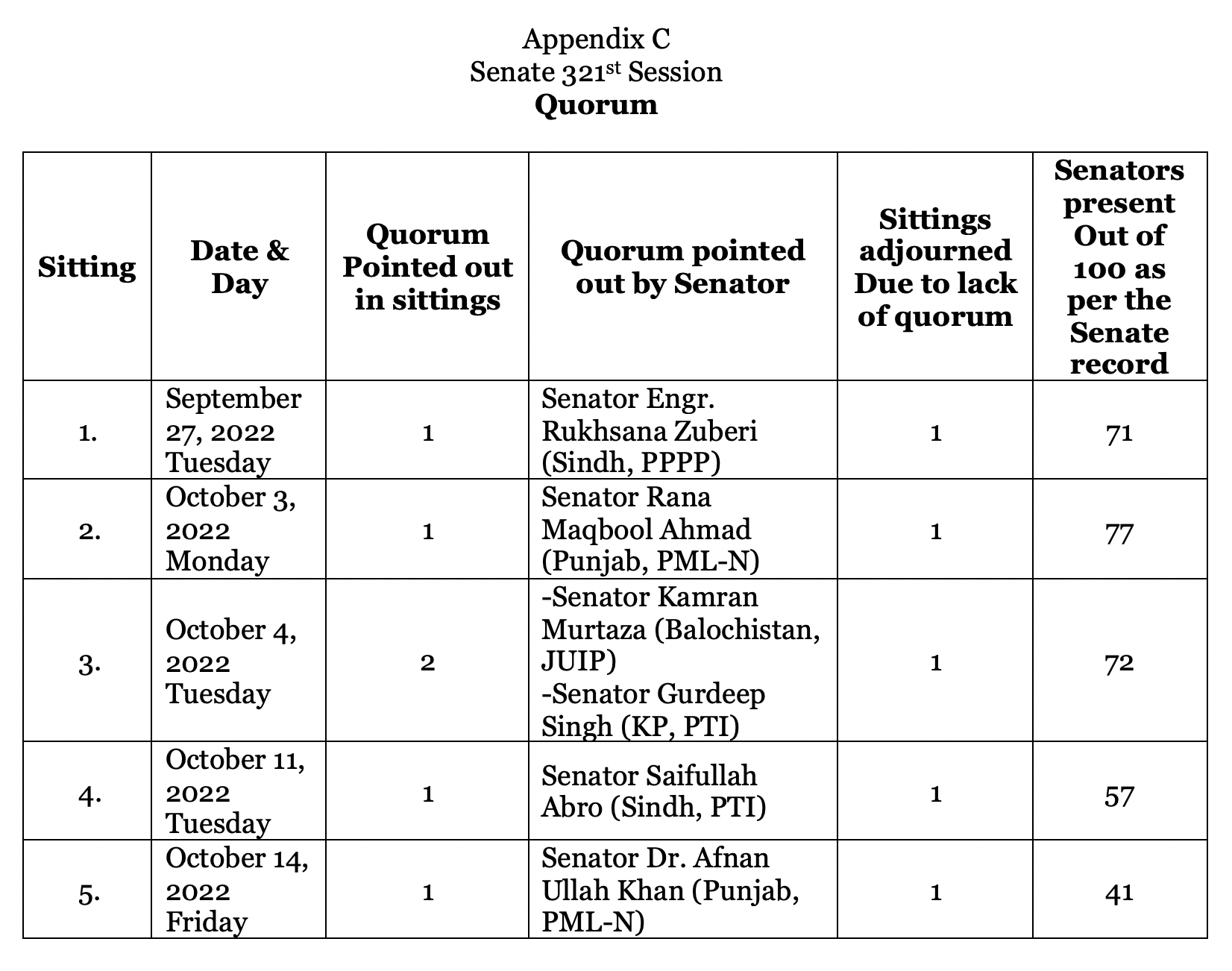Highlights
- Senate met for only 25 hours and 39 minutes in 12 Sittings
- Average time per sitting recorded at 2 hours and 8 minutes
- Longest sitting of 321st session held for 4 hours and 12 minutes; Shortest sitting lasted for only 6 minutes
- Each sitting started with an average delay of 5 minutes
- Fourteen (14) bills passed by the Senate in 321st Session
Working Hours
The 321st session of the Senate began on September 26 and was prorogued on October 21. During the session spanning 26 days only 12 sittings were convened. The schedule of the sittings during the session is given in Appendix A.
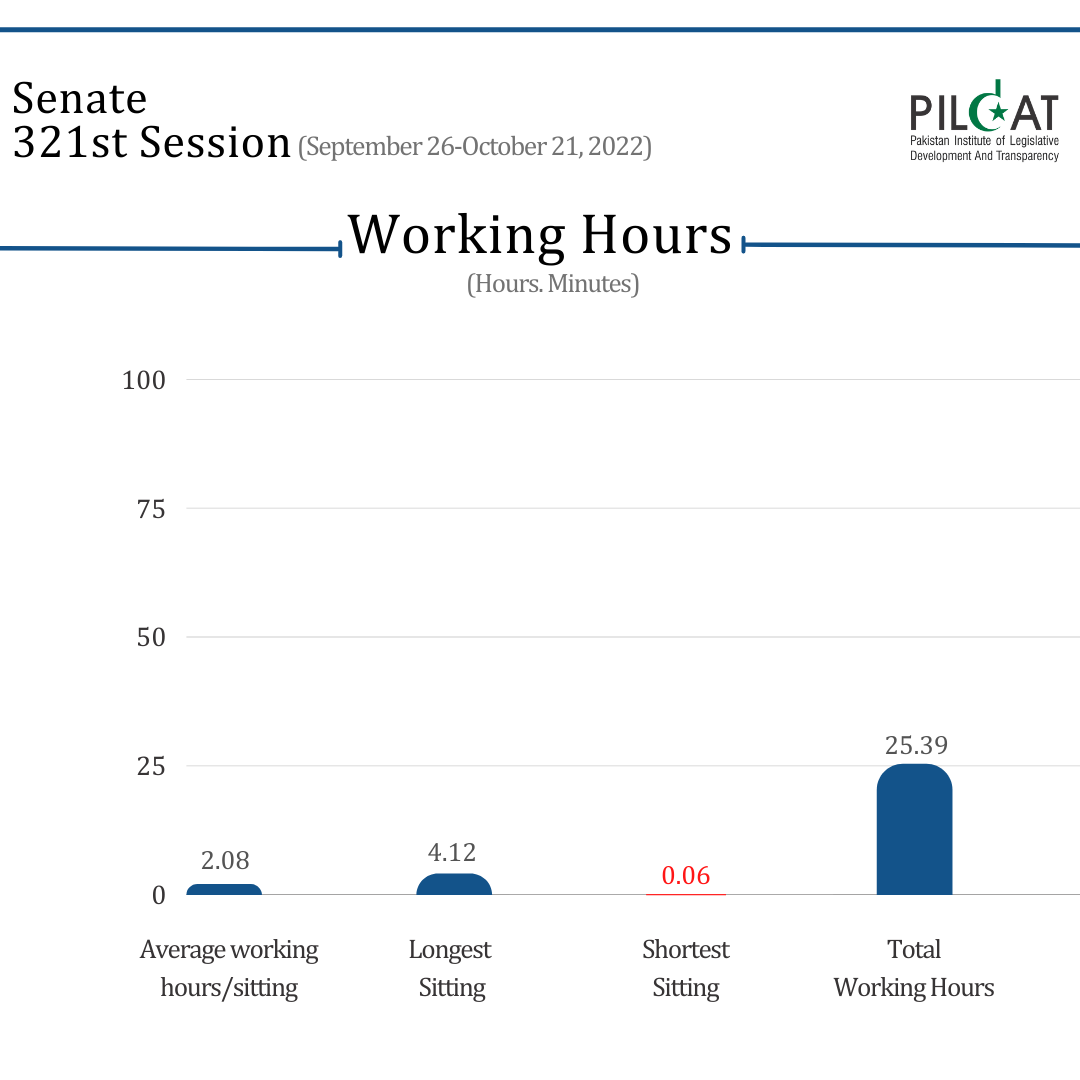
This 321st Session of the Senate met for 25 hours and 39 minutes with an average time of 2 hours and 8 minutes per sitting. The longest sitting of the session was held on Monday, September 26 when the House was adjourned after meeting 4 hours and 12 minutes. The shortest sitting was held on Friday, October 14 when 95.24% agenda items were left over and the House was adjourned due to lack of quorum after meeting for only 6 minutes, even though 41 Senators were recorded as present on the day.
The average delay in starting a sitting was 5 minutes during the session.
Agenda Items Left Over

On average 43.92% agenda items were left over during the 321st session and the Senate could dispose only 56.08% of its agenda items in 12 sittings. Maximum agenda items left over were 96.43% on October 17 due to the protest by the opposition to release Senator Muhammad Azam Khan Swati. Minimum agenda items left over were 9.09% on October 11 while the Senate disposed of the whole agenda items on September 26 and September 30. Details of the Agenda Items Left over are given in Appendix B.
Quorum
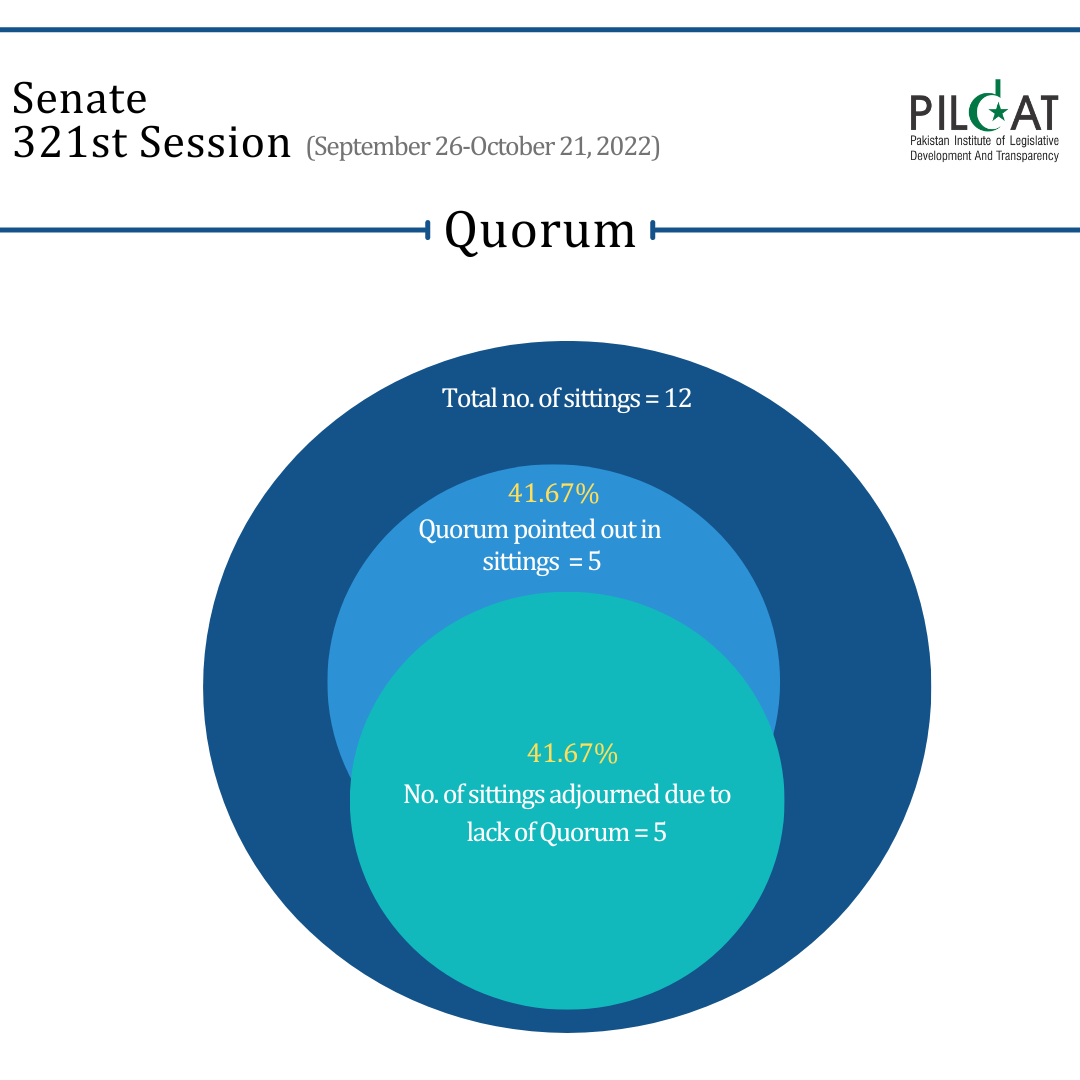
Lack of quorum was pointed out 6 times in five (5) or 41.67% out of 12 sittings during the session. The same five sittings were adjourned due to lack of quorum. This was despite the fact that on average 63 (63%) Senators marked attendance in the session. The details of the quorum pointed out are given in Appendix C.
Attendance
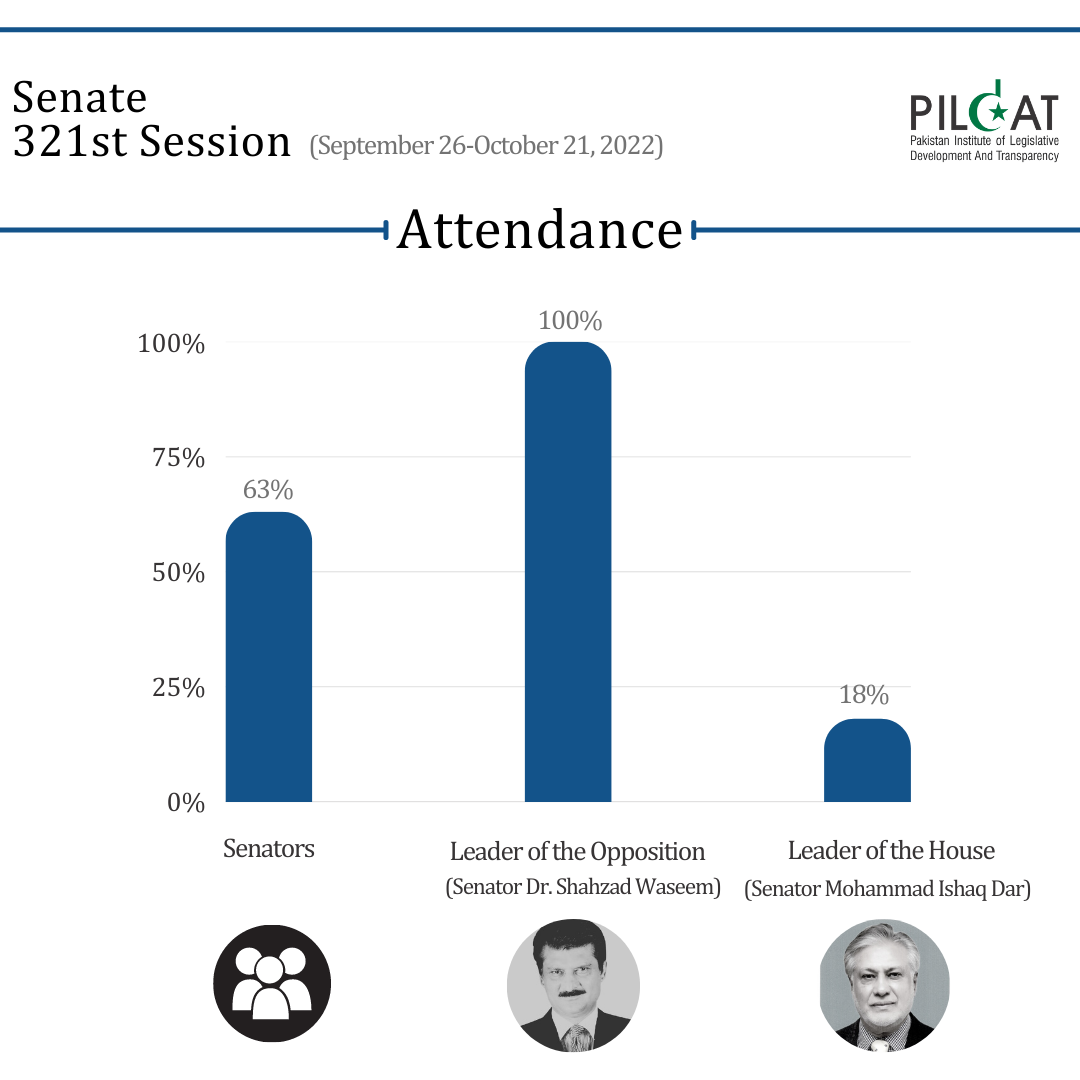
Senator Dr. Shahzad Waseem, Leader of the Opposition in the Senate (Punjab, PTI) attended 12 or 100% sittings during the session. He was followed by Senator Mohammad Ishaq Dar, Leader of the House (Punjab, PML-N), who attended only 2 or 18% out of 11 sittings during the session. It must be noted that Senator Mohammad Ishaq Dar took oath as Senator on September 27, 2022 and replaced Senator Azam Nazeer Tarar on September 30, 2022 as Leader of the House.[1] On average, 63 or 63% Senators were recorded as present during the 321st session.
Top 5 Vocal Senators
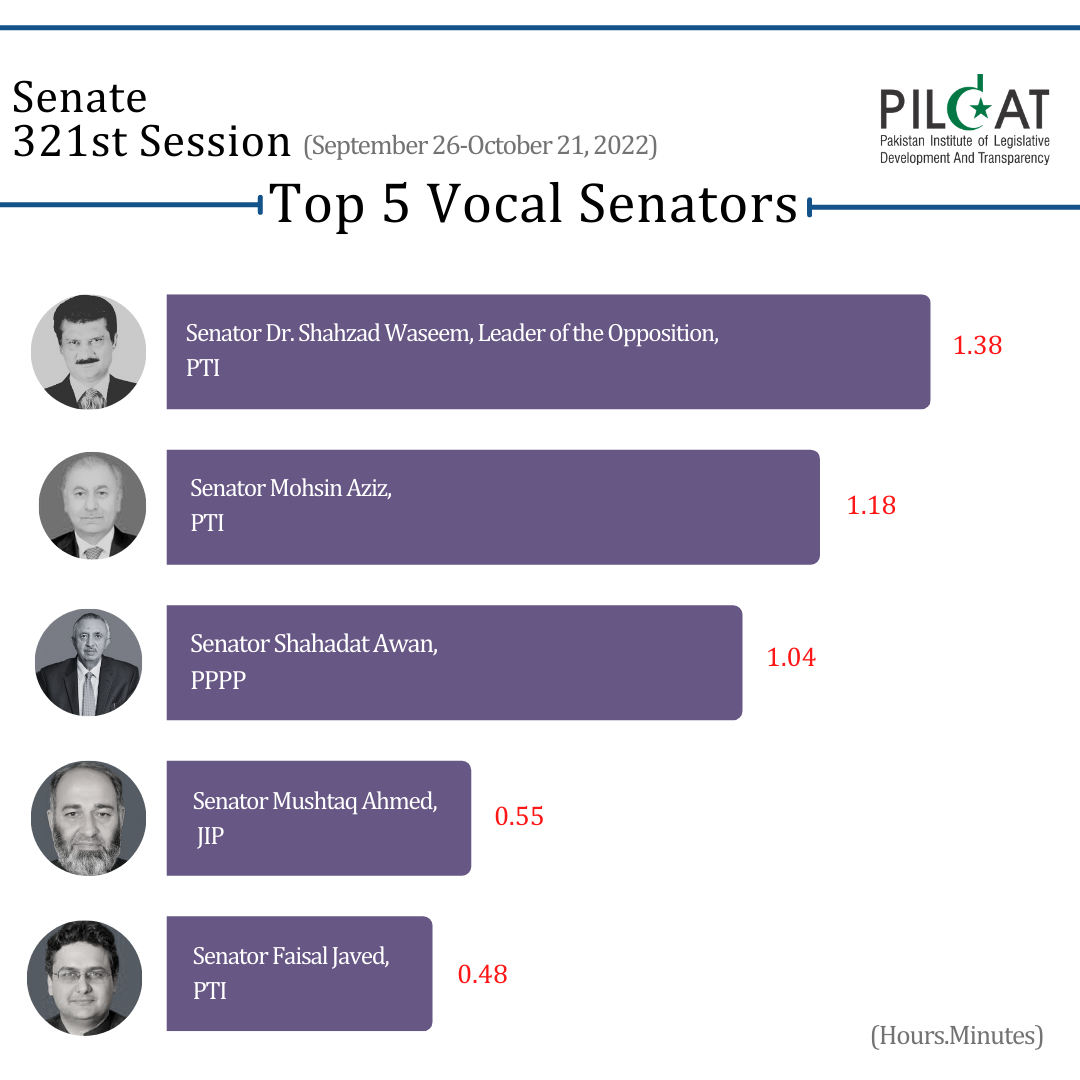
Senator Dr. Shahzad Waseem, Leader of the Opposition (Punjab, PTI), was the most vocal Senator during 321st session with a recorded talk time of 1 hour and 38 minutes. He was followed by Senator Mohsin Aziz (KP, PTI) who spoke for 1 hour and 18 minutes. Senator Shahadat Awan (Sindh, PPPP), Minister of State for Law and Justice spoke for 1 hour and 4 minutes and Senator Mushtaq Ahmed (KP, JIP) spoke for 55 minutes during the session. Senator Faisal Javed (KP, PTI) spoke for 48 minutes.
Legislation

During 321st session, the Senate passed 14 bills. Out of these, 3 private members’ bills were introduced in the Senate while 8 government bills and 3 private members’ bills were transmitted from the National Assembly.
The three (3) private members’ bills passed included the following:
- The Chairman and Speaker (Salaries, Allowances and Privileges) (Amendment) Bill, 2022 aimed “at provision of entitlement of protocol and status of the Chairman Senate and Speaker of National Assembly as Deputy Head of State or Vice President of the host country while travelling abroad for official business, in line with the rules of international courtesy, formal communication norms and ceremonial practices to follow in official functions and occasions.” The bill was introduced by Senator Dilawar Khan (KP, PML-N), Senator Syed Shibli Faraz (KP, PTI) and Senator Naseebullah Bazai (Balochistan, IND). The bill was passed by the Senate on September 26, 2022.
- The Access to the Media (Deaf) Persons Bill, 2022 was introduced by Senator Saleem Mandviwalla aimed at taking steps to ensure special persons (Deaf) access to the media which is their fundamental right. The bill was passed on September 26, 2022.
- The National Commission on the Rights of Child (Amendment) Bill, 2022 was introduced by Senator Faisal Javed (KP, PTI) to cater for the needs of unattended children and also to address the conduct of unconcerned parents towards such neglected children. The bill was passed on October 3, 2022.
Private Members’ Bills passed (Originated in the Senate) during 321st session
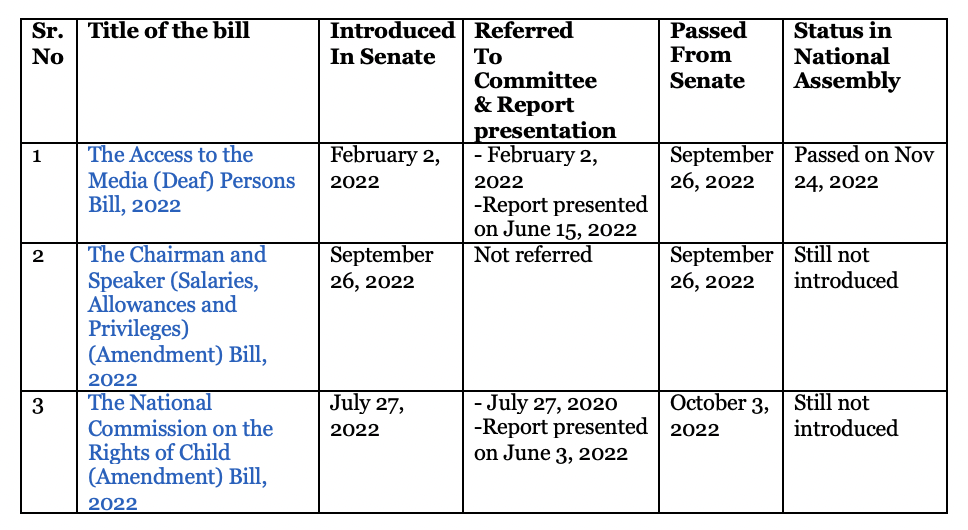
The eight (8) government bills which were transmitted from the National Assembly and passed during the session included:
- The Export-Import Bank of Pakistan Bill, 2022 seeking to establish the Export-Import Bank of Pakistan as the national export agency for the promotion, expansion and diversification of international trade by providing credit, guarantee and insurance products as well as ancillary services to exporters and importers in the form of a statutory corporation. It was enacted on October 14, 2022.
- The Publication of Laws of Pakistan (Amendment) Act, 2022 for smooth functioning of the Laws of Pakistan Cell, to encourage and facilitate the publisher to publish more law books at low-cost for general public, to increase the period for issuance of certificate of accuracy from twenty working days to three months and to omit punishment of imprisonment in order to encourage more publishers to publish the law books and also to provide for indemnity to protect the Federal Government, Provincial Governments and officers of the respective Cells exercising any powers or performing any functions under the bill. It became Act of Parliament on October 14, 2022.
- The Diplomatic and Consular Officers (Oath and Fees) (Amendment) Bill, 2022 to enable and facilitate online services by saving time, reducing cost, and minimizing the difficulties to reach the Consulate and Mission. This bill also sought to empower Federal Government to make rules for carrying out the purposes of the Act XXI of 1948. It was also enacted on October 14, 2022.
- The Railways (Amendment) Bill, 2022 sought to amend the “colonial” Railways Act 1890 which awarded death penalty or life sentence, converted to life sentence only under this bill, to anyone found involved in endangering the safety of railway passengers. This bill became an Act of Parliament on October 21, 2022.
- The Torture and Custodial Death (Prevention and Punishment) Bill, 2022 to criminalize and prevent acts of torture, custodial death and custodial rape committed against persons held in custody by public officials, and to provide redress to the victims of such acts. This bill became an Act of Parliament on November 1, 2022.
- The Anti-Dumping Duties (Amendment) Bill, 2022 according to which Chinese firms have been exempted from anti-dumping duty for products used in building Gwadar’s new airport. It was enacted on November 1, 2022.
- The Criminal Laws (Amendment) Bill,2022 to criminalize the heinous crime of enforced disappearance with impunity that surrounds the practice of enforced disappearances and bring the perpetrators of these crimes to justice so as to provide closure to the families whose loves ones are still unknown. It was enacted on December 22, 2022.
- The Inter-Governmental Commercial Transactions Bill, 2022 to promote, attract and encourage foreign states to have economic and business relations with the Islamic Republic of Pakistan. It was enacted on November 2, 2022.
Government bills passed by the Senate that were transmitted by the National Assembly
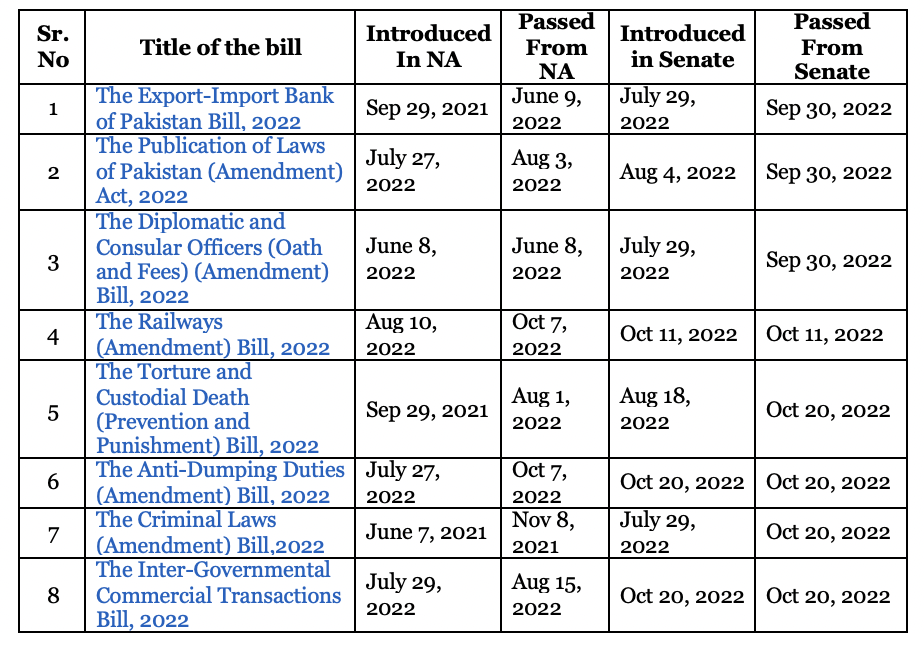
The three (3) Private Members’ bills which were transmitted from the National Assembly and passed by the Senate during the session included the following:
- The Pakistan Institute of Medical Sciences (PIMS) Bill, 2022 repealed the Federal Medical Teaching Institutes Act, 2021 (XII of 2021). The Pakistan Institute of Medical Sciences (PIMS), Islamabad is the busiest hospital of Federal Capital. “The concept of the establishment of board, management committee and tribunals under the Federal Medical Teaching Institutes Act, 2021 (XII of 2021) is total wastage of the public exchequer. Therefore, it was repealed. The Pakistan Institute of Medical Sciences (PIMS) Bill, 2022 became an Act of Parliament on January 3, 2023.
- The National Assembly Secretariat Employees (Amendment) Bill, 2022 states that sometimes the Federal Public Service Commission cannot complete the selection process due to various reasons within six months of the requisition of the Secretariat for appointment on posts of BPS-16-19. Therefore, it is imperative that provision may be made in the National Assembly Employees Act’ 2018 that in case of inability of the Federal Public Service commission to recommend persons for initial appointment to the Posts from BPS-16 to BPS-19 within 6 months of the receipt of the requisition, the Speaker may withdraw the requisition from the FPSC and make appointments against such posts through an open advertisement and after a selection process on the recommendations of the Departmental Selection Committee. This law was enacted on November 2, 2022.
- The Pakistan Medical and Dental Council, Bill, 2022 aims at consolidating laws relating to registration of medical practitioners and dentists and to reconstitute the Medical and Dental Association Pakistan to establish a uniform standard of basic and higher qualification in the medical and dental fields in Pakistan. It was enacted on January 12, 2023.
Private Members’ bills passed by the Senate that were transmitted by the National Assembly
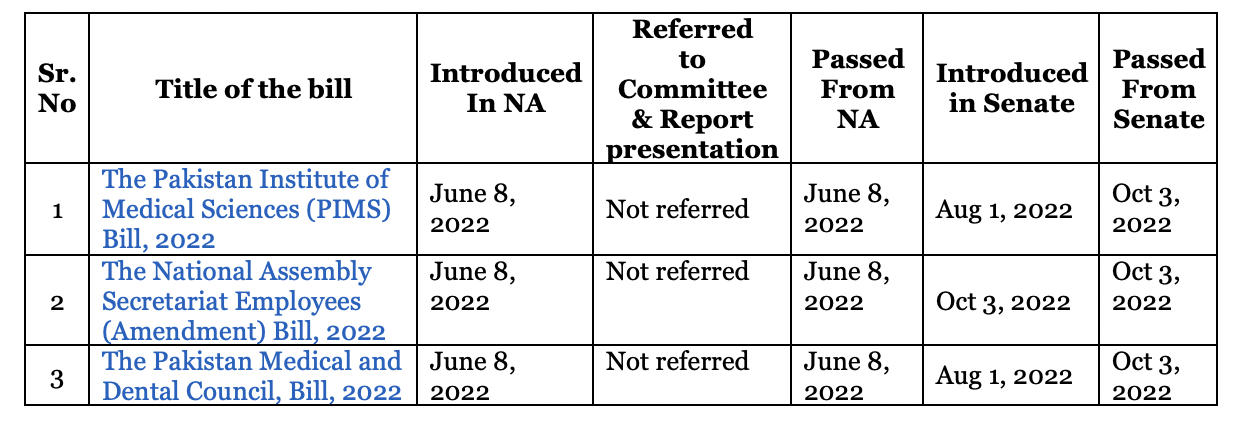
Twenty (20) Private Members’ bills were introduced during the session and all of them were referred to the concerned committees.
No ordinance was laid or extended during the session.
Time consumed on discussion of Policy issues during 321st session
The quality of the time used during the session can be gauged by analyzing the time consumed on discussing key issues of democratic governance. During 321st session, total time consumed for discussion on policy issues spanned over only 3 hours while the Senate consumed 11 hours and 46 minutes on discussion of non-policy issues. The maximum time consumed in discussing policy issues was on a motion ‘Imposition of taxes on tobacco industry of Khyber Pakhtunkhwa’ for 40 minutes while the House spent 1 hour and 40 minutes and 1 hour and 37 minutes on discussing non-policy issues of ‘Deteriorating economic conditions and inflation in Pakistan’ and ‘Inefficiency of the government in dealing with floods victims and rehabilitation work’ respectively.
It must be noted that PILDAT has classified that a policy issue is such that involves any amendment in a bill or a recommendation on devising a policy. Any discussion on an issue that does not go beyond mere criticism or highlighting a concern does not fall into policy issue and is treated as discussion or time spent on non-policy issues.
Time consumed on discussion of Non-Policy issues during 321st session

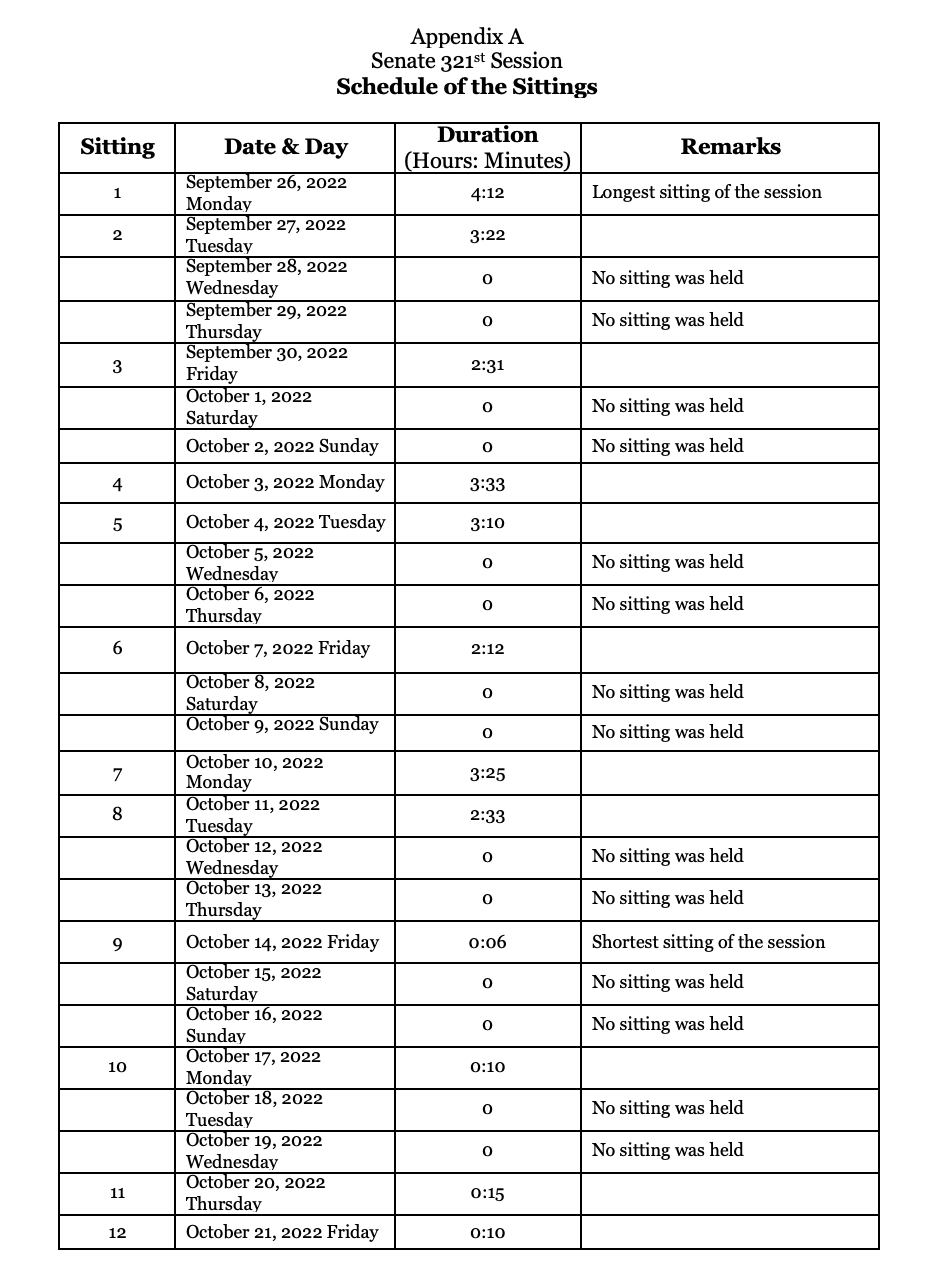
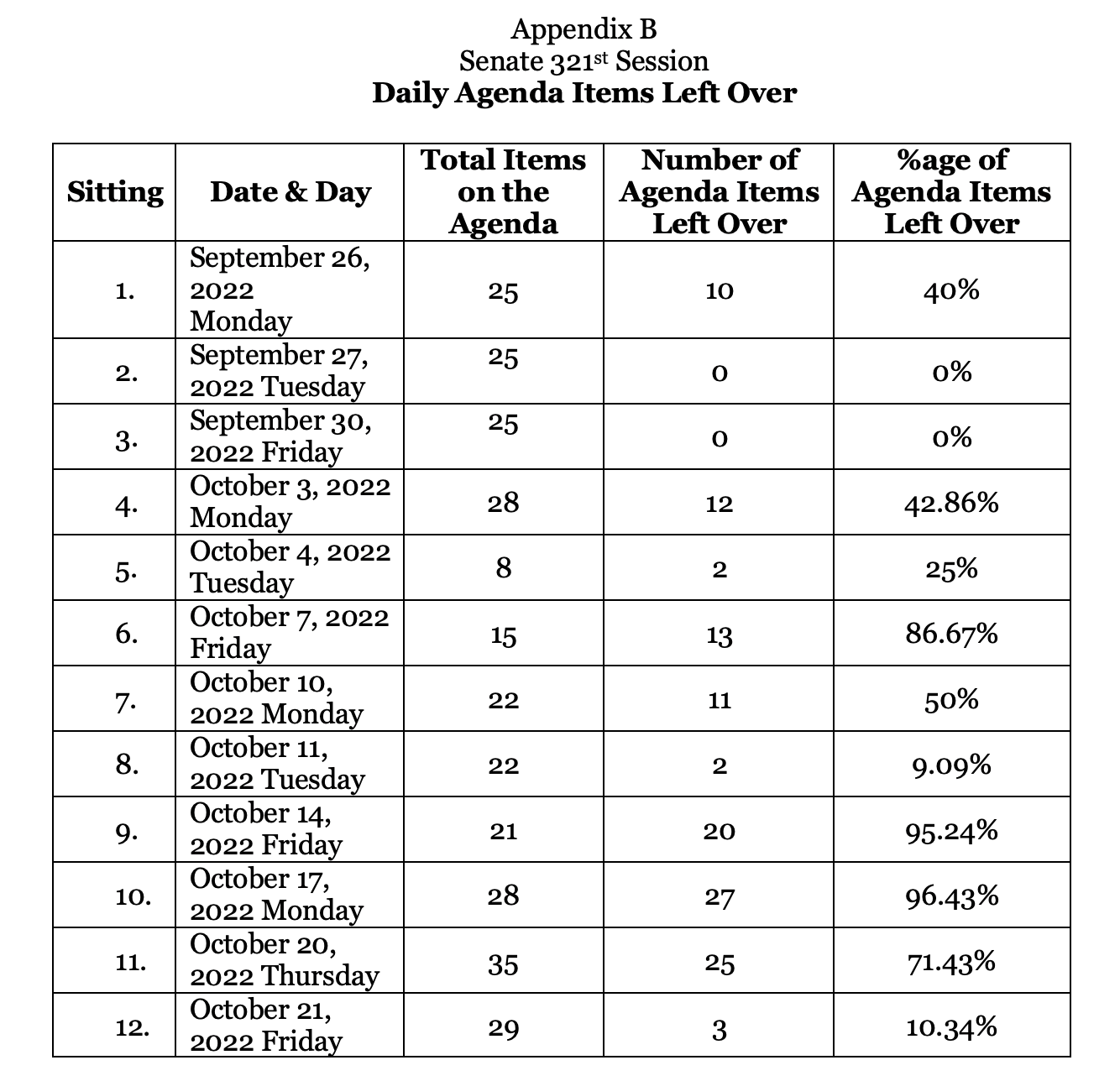
References
-
“PML-N’s Dar appointed house leader in Senate,” The Express Tribune, September 30, 2022, Accessed January 19, 2023 https://tribune.com.pk/story/2379346/pml-ns-dar-appointed-house-leader-in-senate. ↑


